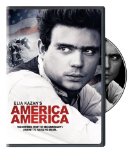| Reviews & Columns |
|
Reviews DVD TV on DVD Blu-ray 4K UHD International DVDs In Theaters Reviews by Studio Video Games Features Collector Series DVDs Easter Egg Database Interviews DVD Talk Radio Feature Articles Columns Anime Talk DVD Savant Horror DVDs The M.O.D. Squad Art House HD Talk Silent DVD
|
DVD Talk Forum |
|
|
| Resources |
|
DVD Price Search Customer Service #'s RCE Info Links |
|
Columns
|
|
|
America America
THE MOVIE:
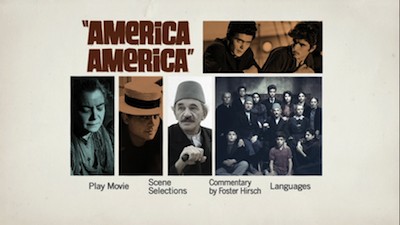
Elia Kazan had already had a long and distinguished--and oft controversial--career in both theatre and cinema by the time he made his most personal film, America America, in 1964. Known for making pictures that pushed the envelope in terms of subject matter, be it challenging moral taboos or exploring socially conscious issues, the filmmaker didn't necessarily abandon those things for his immigration epic, but he found a way to make them more directly about himself and where he came from.
America America is, at its core, a family story. Kazan wrote it as a tribute to his uncle, first in a book and then as this screenplay. Said uncle emigrated from Turkey to the United States in the early 20th century. The cinematic version starts out in 1896. Stavros Topouzoglou (newcomer Stathis Giallelis) is the eldest son in a poor Greek family living in the Anatolian Mountains. As Kazan tells us himself in an introductory voiceover, the area was known for a large Greek and Armenian population when the Turks moved in and took over. At the time of the story, both groups live under occupied rule, and recent Armenian activity has caused an ethnic crackdown. Though Stavros is Greek, he can't avoid being caught up in the unrest. He is business partners with the Armenian worker Vartan (Frank Wolff). They go into the woods together and get ice to sell back down in the village. They both dream of someday leaving Turkey and sailing the Atlantic to find new opportunities in the States.
Pinning their hopes on Stavros and with fingers crossed it might keep him from jail (or worse), the Topouzoglou family sends him to Constantinople with all of their valuable possessions and traditions. The plan is for him to join his uncle's business there and slowly bring the rest of the clan along once he starts making money. On his trek, he meets an opportunistic Turk (Lou Antonio) who chisels him out of all his goods, setting off a chain of events that puts the young boy way off course. Unable to take up with his uncle, he ends up on the streets trying to make his fortune, only to continually lose what little he makes, run afoul of violence, and generally screw up. The other men call him "America America" because that's all he can talk about--one day getting enough cash to go to the Land of Opportunity.
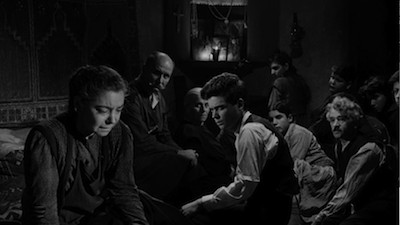
Unlike most immigrant stories, Kazan isn't concerned with what happens once Stavros finally gets overseas. This is the story of the long and difficult process of escape. America isn't a reality, it's a fantasy, an image in advertisements and on postcards. Stavros doesn't have a dream of doing anything when he gets there, his dream is just getting there. Opportunity will be opportunity, it doesn't matter what it is.
Kazan shot most of America America on location overseas. Though many of his previous films brought a new social realism into American cinema, as well as a new kind of performance--he worked with both Marlon Brando and James Dean, who became icons of method acting--America America has more in common with Italian Neorealists than it does A Streetcar Named Desire. Working with mostly unknown, untested talent, he was able to create a film that is grounded in naturalism, even as the script toys with more traditional storytelling, including the oral tradition that allowed family stories of this kind to be passed on from generation to generation.
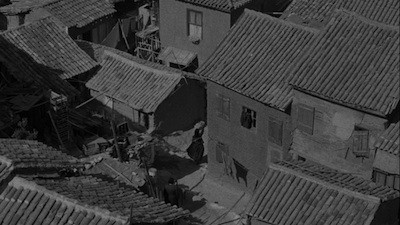
Haskell Wexler's amazing black-and-white photography presents the harsh life without any varnish. The sets and locations can be majestic and elaborate, yet the poverty is evident. Most of the settings are broken down, and people live on top of one another. Likewise, the costumes are torn and dirty. We can see the effects homelessness has on Stavros. By contrast, glimpses of the finer side of life seem almost contrived. An American that Stavros briefly encounters looks like he pulled his immaculate period suit straight out of studio wardrobe. When Stavros joins a wealthy family, their life also looks like costume drama put together by a vast production team. Don't take that as a criticism, either. I think this was intentional on Kazan's part, he wanted to show how deep the divide between the classes and how unreal the reality of the upper crust could be.
These finer things are just another temptation to Stavros, and temptation is just a distraction. Also, short cuts are a danger. Surprisingly (or maybe not so), women prove to be the key to a lot of his actual success--and fittingly, the actresses in the movie stand out. Linda Marsh is heartbreaking as Stavros' understanding and longsuffering spouse, and Katharine Balfour draws pity in a whole other way as a sheltered American wife. Ultimately, though, Stavros' path to success is reliant entirely on him. He must maintain focus and never waver from his goal. In this, America America is both a cautionary tale and statement of hope. One must never forget the struggles and sacrifice of those who have journeyed to the States in search of a better life, and how that goes deep down to the core of what the country stands for and what it was founded on. The actual achievement is not a fairy tale, it is not always clean or even honest, but the impulse to be a part of the great experiment is always worthy of tribute.
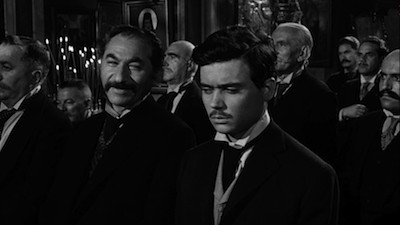
THE DVD
Video:
America America has long been absent from DVD, debuting in North America only a couple of months ago as part of a larger Kazan boxed set. I was pleased to hear that Warners was also going to be offering it separately. Having had a chance to see the movie on a well-worn VHS copy a couple of years ago, I was eager to experience it again in a better format. Despite it having been successful upon its initial release, garnering much acclaim and picking up plenty of award nominations--and even an Oscar win for art direction--America America seemed to have largely been left by the wayside.
The image quality of this long overdue DVD release is excellent. Originally shot on 35mm at 1.66:1, the widescreen image is well-rendered here, with good contrast in the imagery and a clean surface. Scratches or damage are few and far between, and the overall resolution is sharp.
Sound:
The mono audio track for America America is a little bit glitchy. Though all dialogue is easy to hear, there is a regular cricket-like whistle that comes in and out throughout the picture. It's not overbearing, and eventually I got used to it, but it struck me as odd. It mostly came out of my center speaker. There is also about two minutes of a windy hiss that comes in at about the hour-and-thirty-eight-minute mark.
Excepting all that, the dialogue is clean and nothing is ever covered up nor do any lines drop out. Subtitle options include English SDH and French.
Extras:
The sole extra on the disc is a commentary by historian Foster Hirsch. A big fan of the film and of Kazan in general, Hirsch does a good job of contextualizing America America within the director's greater filmography, looking at the nuts and bolts of the movie and how it pertains to everything else.
FINAL THOUGHTS:
Elia Kazan's epic tale of struggle, heartbreak, and dreams is an engrossing, altogether unique depiction of the immigrant's journey. Set at the turn of the 20th century, America America is the story of one Greek boy's efforts to leave Turkey and go to the United States. Based on the real-life journey of Kazan's uncle, it is a narrative full of roadblocks and mishaps, and the main character has his fair share of flaws, but all of the mistakes and difficulties only cause him to build a head of steam. He is growing and becoming human on his way to becoming an American. Highly Recommended.
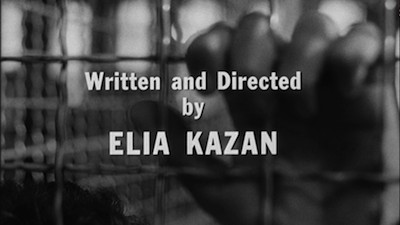
Jamie S. Rich is a novelist and comic book writer. He is best known for his collaborations with Joelle Jones, including the hardboiled crime comic book You Have Killed Me, the challenging romance 12 Reasons Why I Love Her, and the 2007 prose novel Have You Seen the Horizon Lately?, for which Jones did the cover. All three were published by Oni Press. His most recent projects include the futuristic romance A Boy and a Girl with Natalie Nourigat; Archer Coe and the Thousand Natural Shocks, a loopy crime tale drawn by Dan Christensen; and the horror miniseries Madame Frankenstein, a collaboration with Megan Levens. Follow Rich's blog at Confessions123.com.
|
| Popular Reviews |
| Sponsored Links |
|
|
| Sponsored Links |
|
|
| Release List | Reviews | Shop | Newsletter | Forum | DVD Giveaways | Blu-Ray | Advertise |
|
Copyright 2024 DVDTalk.com All Rights Reserved. Legal Info, Privacy Policy, Terms of Use,
Manage Preferences,
Your Privacy Choices | |||||||









